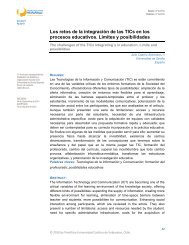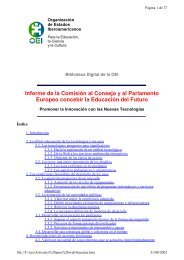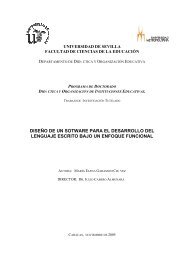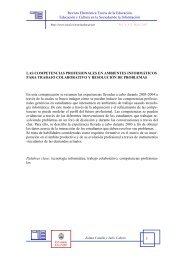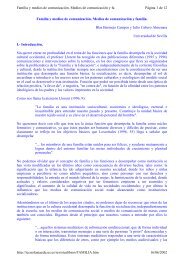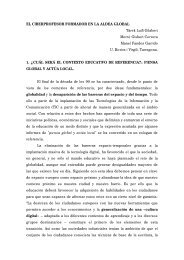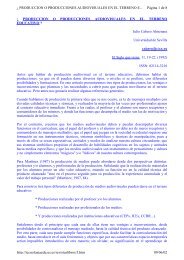The relevance of video games and gaming consoles to the Higher ...
The relevance of video games and gaming consoles to the Higher ...
The relevance of video games and gaming consoles to the Higher ...
You also want an ePaper? Increase the reach of your titles
YUMPU automatically turns print PDFs into web optimized ePapers that Google loves.
TSW 02-01APRIL 2002<strong>The</strong> <strong>relevance</strong> <strong>of</strong> <strong>video</strong> <strong>games</strong> <strong>and</strong> <strong>gaming</strong> <strong>consoles</strong> <strong>to</strong><strong>the</strong> <strong>Higher</strong> <strong>and</strong> Fur<strong>the</strong>r Education learning experience© JISC 200223 rd April 2002v 2.12John KirriemuirCeangalhttp://www.ceangal.com/john@ceangal.com
1. IntroductionVideo <strong>games</strong> have been a significant form <strong>of</strong> entertainment since <strong>the</strong> early 1970’s, appearing in anumber <strong>of</strong> formats <strong>and</strong> locations: television-dependent <strong>consoles</strong>, portable <strong>games</strong> machine, <strong>games</strong>on LCD panels, amusement arcades <strong>and</strong> so on. Often, <strong>games</strong> technology has been combined withcomputing-oriented technologies, resulting in hybrid machines such as <strong>the</strong> ZX Spectrum, BBCmicro series <strong>and</strong> <strong>the</strong> Amiga.Traditionally, <strong>the</strong> <strong>video</strong> <strong>gaming</strong> industry has been cyclical in terms <strong>of</strong> pr<strong>of</strong>ile, <strong>the</strong> number <strong>of</strong>machine owners <strong>and</strong> revenue. However, several fac<strong>to</strong>rs including <strong>the</strong> emergence <strong>of</strong> cultural iconse.g. Mario, Sonic <strong>and</strong> Lara Cr<strong>of</strong>t, increases in game complexity <strong>and</strong> visual appearance, <strong>and</strong>massive sustained sales <strong>of</strong> <strong>games</strong> <strong>consoles</strong> such as <strong>the</strong> Sony Playstation <strong>and</strong> Nintendo Game Boyseries, have led <strong>to</strong> <strong>video</strong> <strong>gaming</strong> becoming a significant part <strong>of</strong> contemporary culture since <strong>the</strong> mid-1990’s. <strong>The</strong> <strong>video</strong> <strong>gaming</strong> industry generates revenue <strong>of</strong> between 18 <strong>and</strong> 25 billion US dollars peryear (according <strong>to</strong> various estimates), with development costs, revenue <strong>and</strong> use/audiencecomparable (<strong>and</strong> <strong>of</strong>ten exceeding) that <strong>of</strong> <strong>the</strong> movie industry.Games <strong>and</strong> <strong>games</strong> <strong>consoles</strong> have steadily increased in terms <strong>of</strong> technological, graphical <strong>and</strong>processing complexity <strong>and</strong> power. Contemporary <strong>video</strong> <strong>consoles</strong> are comparable <strong>to</strong> specialisedPCs, designed <strong>to</strong>wards a narrow range <strong>of</strong> applications. <strong>The</strong> last three years has seen an increasingnumber <strong>of</strong> studies <strong>and</strong> research in<strong>to</strong> <strong>the</strong> use <strong>of</strong> <strong>video</strong> <strong>games</strong>, <strong>and</strong> <strong>gaming</strong>-oriented techniques, inlearning <strong>and</strong> teaching scenarios <strong>and</strong> applications.This report presents an overview <strong>of</strong> <strong>gaming</strong> <strong>consoles</strong> <strong>and</strong> a comparison <strong>of</strong> <strong>consoles</strong> <strong>and</strong> <strong>the</strong> PC.Benefits <strong>of</strong> <strong>games</strong> <strong>to</strong> learning <strong>and</strong> <strong>the</strong> learning environment are <strong>to</strong>uched on, as is <strong>the</strong> use <strong>of</strong> <strong>games</strong><strong>consoles</strong> in research <strong>and</strong> teaching. Issues pertaining <strong>to</strong> potential future applications <strong>of</strong> <strong>games</strong> <strong>and</strong><strong>consoles</strong> <strong>to</strong> learning <strong>and</strong> teaching, especially through <strong>the</strong> enhanced functionality <strong>of</strong> <strong>consoles</strong>, areaddressed. <strong>The</strong> report concludes with an overview <strong>of</strong> o<strong>the</strong>r <strong>gaming</strong> platforms, <strong>and</strong> a summary <strong>of</strong>key points <strong>and</strong> trends <strong>to</strong> moni<strong>to</strong>r.To assist in <strong>the</strong> compilation <strong>of</strong> this report, an email survey was undertaken <strong>of</strong> various computer <strong>and</strong><strong>video</strong> game researchers in UK academia, <strong>and</strong> <strong>video</strong> game companies worldwide, in early 2002.This survey was useful in discovering trends, perceptions <strong>and</strong> examples <strong>of</strong> non-<strong>gaming</strong> uses <strong>of</strong><strong>video</strong> <strong>games</strong> <strong>and</strong> <strong>gaming</strong> <strong>consoles</strong>.2. Overview <strong>of</strong> contemporary <strong>gaming</strong> <strong>consoles</strong>As <strong>of</strong> <strong>the</strong> beginning <strong>of</strong> 2002, <strong>the</strong> global <strong>games</strong> console sec<strong>to</strong>r is dominated by three companies:Micros<strong>of</strong>t (from <strong>the</strong> US), <strong>and</strong> Nintendo <strong>and</strong> Sony (both from Japan).2.1 Micros<strong>of</strong>tMicros<strong>of</strong>t is a new producer <strong>of</strong> <strong>consoles</strong>, though it has <strong>video</strong> game development experience throughvarious s<strong>of</strong>tware – <strong>the</strong> most well-known <strong>of</strong> which is <strong>the</strong> Flight Simula<strong>to</strong>r series for <strong>the</strong> PC. InNovember 2001, Micros<strong>of</strong>t launched its Xbox console in <strong>the</strong> US; this was followed by launches inJapan (February 2002) <strong>and</strong> Europe (March 2002).<strong>The</strong> launch <strong>of</strong> <strong>the</strong> Xbox was accompanied by a strong array <strong>of</strong> <strong>games</strong>, some highly criticallyacclaimed. <strong>The</strong> variety <strong>and</strong> quality <strong>of</strong> <strong>the</strong>se “launch <strong>games</strong>“ was a key fac<strong>to</strong>r in Micros<strong>of</strong>t selling 1.5million <strong>consoles</strong> in <strong>the</strong> US between <strong>the</strong> launch date <strong>and</strong> <strong>the</strong> end <strong>of</strong> 2001. An average <strong>of</strong> over three<strong>games</strong> was bought per hardware unit sold; this was good news for Micros<strong>of</strong>t, as <strong>the</strong> Xbox follows<strong>the</strong> typical revenue model for a <strong>games</strong> console, where <strong>the</strong> hardware sells at a loss per unit but <strong>the</strong>manufacturer makes money on s<strong>of</strong>tware royalties.
A range <strong>of</strong> peripherals will appear for <strong>the</strong> Xbox over 2002, including a DVD remote control, a HDTV(High Definition TV) cable <strong>and</strong> a broadb<strong>and</strong> adapter.It is evident from <strong>the</strong> amount <strong>of</strong> revenue Micros<strong>of</strong>t have invested in <strong>the</strong> Xbox (including a globalpublicity budget <strong>of</strong> some half a billion dollars), that <strong>the</strong> Xbox is viewed as a key Micros<strong>of</strong>t product.Long term arrangements with a variety <strong>of</strong> <strong>the</strong> leading <strong>games</strong> publishers indicate that Micros<strong>of</strong>tintend <strong>to</strong> become <strong>and</strong> remain a key <strong>games</strong> sec<strong>to</strong>r “player” for at least several years.2.2 NintendoIn late 2001, Nintendo launched its GameCube console in <strong>the</strong> US <strong>and</strong> Japan, with a Europeanlaunch due in May 2002. Unlike <strong>the</strong> Xbox <strong>and</strong> <strong>the</strong> Playstation2, <strong>the</strong> GameCube will not be able <strong>to</strong>play DVDs, a disadvantage some industry commenta<strong>to</strong>rs speculate may affect sales.Nintendo recently launched <strong>the</strong> Game Boy Advance, a continuation <strong>of</strong> its Game Boy series whichhas sold over 130,000,000 units <strong>to</strong> date. Nintendo currently has no significant competition in <strong>the</strong>h<strong>and</strong>held <strong>gaming</strong> console sec<strong>to</strong>r, a position likely <strong>to</strong> continue for at least <strong>the</strong> next few years.<strong>The</strong> Game Boy series has been host <strong>to</strong> a large number <strong>of</strong> <strong>games</strong>, <strong>the</strong> most well-known being <strong>the</strong>Pokemon series. <strong>The</strong> considerable revenue from this series <strong>and</strong> associated “spin-<strong>of</strong>fs” such asPokemon trading cards <strong>and</strong> movies, <strong>and</strong> <strong>the</strong> revenue from <strong>the</strong> Game Boy h<strong>and</strong>held itself, ensuresthat Nintendo has financial security for <strong>the</strong> foreseeable future, irrespective <strong>of</strong> sales <strong>of</strong> <strong>the</strong>GameCube <strong>and</strong> related s<strong>of</strong>tware.2.3 Sony<strong>The</strong> Playstation 2 (PS2) was launched in 2000. Just as <strong>the</strong> Game Boy Advance can play <strong>games</strong>produced for previous models in <strong>the</strong> Game Boy series, so <strong>the</strong> PS2 has <strong>the</strong> ability <strong>to</strong> play <strong>games</strong>produced for <strong>the</strong> original Playstation. <strong>The</strong>re are an estimated 300 titles in development for <strong>the</strong> PS2.Sony is speculated <strong>to</strong> be working with Toshiba <strong>and</strong> IBM <strong>to</strong> develop next generation style semiconduc<strong>to</strong>rswhich are likely <strong>to</strong> form part <strong>of</strong> <strong>the</strong> Playstation3 console; opinions differ as <strong>to</strong> when sucha console would be launched, with most industry commenta<strong>to</strong>rs predicting 2004 or 2005.Sales <strong>of</strong> its current <strong>and</strong> previous Playstation models, an installed global base (<strong>and</strong> continuinghealthy sales) <strong>of</strong> over 20,000,000 PS2s, royalties from <strong>games</strong>, <strong>and</strong> revenue from its o<strong>the</strong>r consumerdivisions mean it is probable that Sony will remain a key console manufacturer for at least <strong>the</strong> firsthalf <strong>of</strong> this decade.2.4 contemporary <strong>games</strong>Games have changed out <strong>of</strong> all recognition since <strong>the</strong> crude “bat <strong>and</strong> ball” simulations <strong>of</strong> <strong>the</strong> 1970s,or <strong>the</strong> arcade-originating Space Invader <strong>and</strong> Pacman <strong>games</strong> <strong>of</strong> later years. Many <strong>games</strong>, especiallyon newer <strong>consoles</strong>, feature very detailed graphics, complex interface systems, increasingly realisticcharacter AI, intercut FMV (full motion <strong>video</strong>) scenes, orchestra complexity sound, multiplayer <strong>and</strong>online options.<strong>The</strong>re are an increasing number <strong>of</strong> specialist publications, such as EDGE magazine, that describecomputer <strong>and</strong> <strong>video</strong> <strong>gaming</strong> developments. However, advances <strong>and</strong> complexity in <strong>games</strong> can onlybe really appreciated by play <strong>and</strong> interaction. Most people know someone who owns <strong>and</strong> uses a<strong>games</strong> console; in addition, many <strong>games</strong> shops (e.g. Game, Electronic Boutique) <strong>and</strong> music chains(e.g. HMV, Virgin) have <strong>consoles</strong> set up <strong>to</strong> allow members <strong>of</strong> <strong>the</strong> public <strong>to</strong> test <strong>and</strong> play <strong>video</strong><strong>games</strong>.2.5 demographics
<strong>The</strong> size <strong>of</strong> <strong>the</strong> <strong>video</strong> game industry is best illustrated by comparison with o<strong>the</strong>r cultural <strong>and</strong>entertainment industries. <strong>The</strong> following table [ILS] compares UK home entertainment spending overrecent years:1998 (£M) 1999 (£M) 2000 (£M)Cinema box <strong>of</strong>fice 565 643 632Video <strong>and</strong> DVD rental 480 453 481Video <strong>and</strong> DVD retail 944 882 1,104Music s<strong>of</strong>tware 1,861 1,944 2,018Leisure s<strong>of</strong>tware i.e. <strong>games</strong> 918 920 934Projections <strong>of</strong> future leisure s<strong>of</strong>tware sales in <strong>the</strong> UK show a gradually accelerating climb inrevenue:2000 (£M) 2001 (£M) 2002 (£M) 2003 (£M)(actual) 934 891 1035 1171This projected climb is due <strong>to</strong> <strong>the</strong> consolidation <strong>of</strong> <strong>the</strong> aforementioned <strong>consoles</strong> marketed byMicros<strong>of</strong>t, Nintendo <strong>and</strong> Sony over <strong>the</strong> first half <strong>of</strong> this decade. Recent sales point <strong>to</strong> <strong>the</strong>se figuresbeing conservative estimates.2.6 online <strong>gaming</strong><strong>The</strong> PC has been heavily used as an online <strong>gaming</strong> machine since <strong>the</strong> first modems weremarketed; consequently, many PC <strong>games</strong> are online-oriented. Titles such as EverQuest <strong>and</strong> UltimaOnline involve many thous<strong>and</strong>s <strong>of</strong> players being simultaneously logged on. One popular title inSouth Korea, a country with a high proportion <strong>of</strong> online game players, is Lineage; on occasion, over200,000 people have simultaneously played <strong>the</strong> game online, usually from cyber cafés.Due <strong>to</strong> <strong>the</strong> lack <strong>of</strong> online functionality in <strong>consoles</strong> prior <strong>to</strong> 1998, online <strong>gaming</strong> has, until veryrecently, been mostly PC based. An exception <strong>to</strong> this has been a selection <strong>of</strong> <strong>games</strong> on <strong>the</strong> SegaDreamcast. In <strong>the</strong> latter stages <strong>of</strong> its short life, a number <strong>of</strong> titles were released that made use <strong>of</strong> anin-built modem. <strong>The</strong> most popular <strong>of</strong> <strong>the</strong>se is Phantasy Star Online [PSO], which allowed peoplefrom around <strong>the</strong> world <strong>to</strong> interact in team-based quests. PSO included a novel speech mode: usinga menu-based system, players selected “speech” which was translated in<strong>to</strong> <strong>the</strong> language <strong>of</strong> <strong>the</strong>recipient. <strong>The</strong>refore, people with different first languages, based anywhere in <strong>the</strong> world, could“converse” during <strong>the</strong> game in a relatively fluid manner.Market experts predict that online <strong>gaming</strong> will be <strong>the</strong> largest area <strong>of</strong> expansion in <strong>the</strong> <strong>video</strong> <strong>games</strong>sec<strong>to</strong>r, an increasingly likely possibility considering <strong>the</strong> number <strong>of</strong> <strong>games</strong> under development thatincorporate some sort <strong>of</strong> online facility. <strong>The</strong> Xbox, PS2 <strong>and</strong> GameCube all possess ports formodem/broadb<strong>and</strong> connectivity, <strong>and</strong> all are developing <strong>the</strong> necessary infrastructure.3. Comparison <strong>of</strong> <strong>the</strong> PC <strong>and</strong> <strong>games</strong> <strong>consoles</strong><strong>The</strong>re are several fundamental differences between <strong>the</strong> PC <strong>and</strong> <strong>gaming</strong> <strong>consoles</strong>. From a technicalperspective, <strong>consoles</strong> can be viewed as stable, closed environment, fixed specification PCs, usuallyrunning a stripped-down operating system that <strong>the</strong> end-user generally does not interact with.3.1 costGames <strong>consoles</strong>, like PCs, reduce in price as <strong>the</strong>y age. This tends <strong>to</strong> happen in jumps <strong>to</strong> coincidewith launches <strong>of</strong> competing <strong>consoles</strong>. UK console prices are generally higher than those elsewherein <strong>the</strong> world, sometimes by a fac<strong>to</strong>r <strong>of</strong> 30-50%. In <strong>the</strong> UK, <strong>the</strong> Playstation2 retails for around £200,<strong>the</strong> Xbox for £199, <strong>and</strong> <strong>the</strong> GameCube will launch at around £130.
3.2 network capabilityNearly all PCs bought for home or small business purchase contain a modem as st<strong>and</strong>ard.<strong>The</strong> PS2 contains a slot for an optional broadb<strong>and</strong> modem, <strong>and</strong> an optional USB modem from o<strong>the</strong>rperipheral developers. Sony is working with Telewest, <strong>and</strong> BT Openworld, <strong>to</strong> develop “net-basedmulti-player <strong>gaming</strong> systems”. Interestingly, both broadb<strong>and</strong> <strong>and</strong> narrowb<strong>and</strong> connections are indevelopment, <strong>of</strong>fering a price-based choice for PS2 owners [PS2 Online]. <strong>The</strong> Xbox is 10/100MbpsE<strong>the</strong>rnet broadb<strong>and</strong> enabled, <strong>and</strong> <strong>of</strong>fers an optional 56Kbps modem capability. <strong>The</strong> GameCubecontains ports for broadb<strong>and</strong> <strong>and</strong> 56K modem connectivity.3.3 similarity <strong>to</strong> PC<strong>The</strong> Xbox is <strong>the</strong> closest <strong>of</strong> <strong>the</strong> three main <strong>consoles</strong>, in terms <strong>of</strong> architecture, <strong>to</strong> a PC. <strong>The</strong> consolecontains a hard drive, on which game positions can be saved; however, <strong>the</strong> main function <strong>of</strong> <strong>the</strong>hard drive is for a game <strong>to</strong> temporarily s<strong>to</strong>re data – accessing <strong>the</strong> hard drive is quicker than readinga disc, thus reducing in-game data read delays. <strong>The</strong> hard drive is also used for players <strong>to</strong> savegame “positions”.3.4 processing powerA limited technical comparison between a PC <strong>and</strong> <strong>games</strong> console can produce an inaccuratepicture. For example, it should be remembered that <strong>the</strong> primary (or sole) function <strong>of</strong> a console is <strong>to</strong>play a game, with no processor or operating system overheads committed <strong>to</strong> o<strong>the</strong>r tasks e.g. viruschecking, printer or peripheral status moni<strong>to</strong>ring. In addition, game players are mostly interested in<strong>the</strong> “best” <strong>games</strong> (defined by a fluid set <strong>of</strong> criteria), which through <strong>gaming</strong> his<strong>to</strong>ry have not alwaysappeared on <strong>the</strong> most technically advanced console <strong>of</strong> <strong>the</strong> time.A limited technical comparison <strong>of</strong> <strong>the</strong> incoming generation <strong>of</strong> television-based <strong>video</strong> <strong>gaming</strong><strong>consoles</strong> is thus:GameCube Playstation2 XboxCPU 128bit 405MHz 128bit 294MHz 32bit 733MHzMain RAM 24Mb 32Mb RAM 64Mb unified memoryGraphics RAM 16Mb 4Mb embedded on GS see aboveGraphics processor 128bit 202MHz 147MHz GS 300MHz Nvidia iGPUO<strong>the</strong>r processorsInput/output processor 200MHz Nvidia MCPXSignal processing unitMemory B<strong>and</strong>width 3.2Gb/sec 3.2Gb/sec 6.4Gb/sec3.5 s<strong>of</strong>tware rangePerhaps <strong>the</strong> starkest difference between PCs <strong>and</strong> <strong>games</strong> <strong>consoles</strong> is in <strong>the</strong> s<strong>of</strong>tware <strong>and</strong>applications that are hosted by both. <strong>The</strong> PC is host <strong>to</strong> a wide range <strong>of</strong> applications, such as wordprocessors, web browsers, <strong>of</strong>fice <strong>to</strong>ols <strong>and</strong> database applications. S<strong>of</strong>tware on <strong>games</strong> <strong>consoles</strong>,until recently, has been almost exclusively <strong>games</strong>-oriented, with a niche <strong>of</strong> educational s<strong>of</strong>tware[Gamerl<strong>and</strong>]. Educational s<strong>of</strong>tware is more common on PCs, which also hosts <strong>games</strong> (though <strong>the</strong>setend <strong>to</strong> be titles which make fuller use <strong>of</strong> <strong>the</strong> keyboard <strong>and</strong> o<strong>the</strong>r PC-centric peripherals).However, as previously mentioned <strong>the</strong> Sega Dreamcast <strong>games</strong> console (1999-2002) shipped withan inbuilt modem <strong>and</strong> proprietary web browser, <strong>of</strong>fering web <strong>and</strong> email access. Though <strong>the</strong>functionality <strong>of</strong> early versions <strong>of</strong> <strong>the</strong> web browser was limited, as it failed <strong>to</strong> recognise a number <strong>of</strong>plug-in media, <strong>the</strong> system <strong>of</strong>fered a very easy <strong>to</strong> use method <strong>of</strong> online access for a cheap cost(currently £50-£60 for <strong>the</strong> hardware/s<strong>of</strong>tware package).
4. Benefits <strong>of</strong> <strong>games</strong> <strong>and</strong> <strong>gaming</strong> <strong>consoles</strong> <strong>to</strong> learning4.1 benefits <strong>of</strong> <strong>games</strong><strong>The</strong>re are a number <strong>of</strong> small-scale investigations <strong>and</strong> commentaries e.g. [CMS] [TEC] concerningpotential <strong>and</strong> actual benefits <strong>of</strong> <strong>video</strong> <strong>games</strong> in education. One study <strong>of</strong> particular interest <strong>to</strong> <strong>the</strong> UKis <strong>the</strong> Computer Games in Education project funded by BECTA [BECTA], where six computer<strong>games</strong> were used in <strong>the</strong> classroom <strong>to</strong> support National Curriculum learning. <strong>The</strong> study found that:“…<strong>The</strong> over-riding appeal <strong>of</strong> <strong>the</strong> <strong>games</strong> in lessons was <strong>the</strong> way in which learningopportunities <strong>and</strong> skills were presented in <strong>the</strong> context <strong>of</strong> a situation attractive <strong>to</strong>young people. Championship Manager presented opportunities in <strong>the</strong> context <strong>of</strong>football, Age <strong>of</strong> Empires gave children control <strong>of</strong> cities <strong>and</strong> armies <strong>and</strong> <strong>The</strong> Simsallowed learners <strong>to</strong> build <strong>and</strong> furnish <strong>the</strong>ir own houses. This combination <strong>of</strong>interactivity with a familiar <strong>and</strong> yet novel situation, with clear <strong>and</strong> agreed aims forlearning, seemed <strong>to</strong> be very effective.”Though <strong>the</strong> study involved a relatively small number <strong>of</strong> <strong>games</strong>, it was able <strong>to</strong> derive a number <strong>of</strong>conclusions:?? <strong>the</strong> role <strong>of</strong> <strong>the</strong> teacher in structuring <strong>and</strong> framing <strong>the</strong> activity <strong>of</strong> <strong>the</strong> learner remains crucial iflearning outcomes are <strong>to</strong> be achieved. <strong>The</strong> teacher wishing <strong>to</strong> use <strong>games</strong> must know what kind<strong>of</strong> content particular titles <strong>of</strong>fer. Also, <strong>the</strong> teacher requires some underst<strong>and</strong>ing <strong>of</strong> <strong>the</strong> controls,menus <strong>and</strong> skill levels <strong>of</strong> <strong>the</strong> game in order <strong>to</strong> use it effectively.?? for some <strong>games</strong> <strong>and</strong> school contexts, working with specific <strong>and</strong> relevant elements or sections <strong>of</strong><strong>the</strong> game may be more useful than using <strong>the</strong> game as a whole.?? simulation <strong>games</strong> can <strong>of</strong>fer learners sophisticated scenarios <strong>to</strong> support meaningful post-gamediscussion.?? an imaginative <strong>and</strong> well-produced game may be flexible <strong>and</strong> complex enough <strong>to</strong> <strong>of</strong>fer a range <strong>of</strong>educational opportunities.?? teachers in <strong>the</strong> study found that use <strong>of</strong> <strong>the</strong> <strong>games</strong> could provide motivation, develop skills <strong>and</strong>encourage collaboration.?? <strong>games</strong> have a significant advantage in that pupils receive immediate feedback on <strong>the</strong>ir actions<strong>and</strong> decisions, inviting exploration <strong>and</strong> experimentation.Overall, <strong>the</strong>re were obvious benefits <strong>to</strong> <strong>the</strong> use <strong>of</strong> components <strong>of</strong> <strong>video</strong> <strong>games</strong> that were relevant <strong>to</strong><strong>the</strong> <strong>to</strong>pic being taught. However, <strong>the</strong> workload <strong>of</strong> <strong>the</strong> teacher is significantly increased, as gameevaluation, familiarity <strong>and</strong> objective planning is required.Fur<strong>the</strong>r research by BECTA has resulted in <strong>the</strong> identification <strong>of</strong> scenarios where <strong>games</strong> cancontribute <strong>to</strong>wards learning skill development, in addition <strong>to</strong> guidelines for capitalising on learningopportunities within <strong>games</strong> [BECTA infosheet].O<strong>the</strong>r studies point <strong>to</strong> computer <strong>and</strong> <strong>video</strong> <strong>games</strong> providing a range <strong>of</strong> benefits, though manyindicate that <strong>the</strong>se only occur when a game is used in a relevant context <strong>to</strong> <strong>the</strong> learning activity orgoal. <strong>The</strong>se benefits include:?? at <strong>the</strong> most basic level (<strong>and</strong> over-quoted in <strong>the</strong> media), game players developing h<strong>and</strong>-eyecoordination.?? <strong>the</strong> development <strong>of</strong> strategic skills, through playing contemporary <strong>games</strong> which are increasinglycomplex <strong>and</strong> non-linear.?? (against <strong>the</strong> stereotype <strong>of</strong> <strong>gaming</strong> as a socially isolating action) <strong>the</strong> development <strong>of</strong> team,social, communication <strong>and</strong> resource sharing skills through <strong>the</strong> playing <strong>of</strong> multi-player <strong>and</strong>(user) team-oriented <strong>games</strong> <strong>and</strong> simulations.?? stimulating curiosity <strong>and</strong> encouraging experimentation in a safe “virtual” environment.
?? encouraging familiarity with technologies, <strong>and</strong> learning how best <strong>to</strong> use <strong>and</strong> manipulates<strong>of</strong>tware.5. Incorporating <strong>games</strong> <strong>consoles</strong> in<strong>to</strong> learning environments5.1 television-based <strong>consoles</strong>Ra<strong>the</strong>r than replacing PCs wholesale, a more likely scenario is <strong>the</strong> use <strong>of</strong> television-based<strong>consoles</strong> in a number <strong>of</strong> specific experiments, research, projects <strong>and</strong> services involving specificdemographics <strong>of</strong> <strong>the</strong> population.One example raised by respondents <strong>to</strong> <strong>the</strong> email survey was that <strong>of</strong> <strong>the</strong> elderly <strong>and</strong> housebound,for which <strong>the</strong>re is strong anecdotal evidence <strong>of</strong> a steadily increasing use <strong>of</strong> <strong>games</strong> <strong>consoles</strong>. This ispartially due <strong>to</strong> <strong>the</strong>ir low cost <strong>and</strong> simplicity <strong>of</strong> operation. Emerging <strong>consoles</strong> have <strong>the</strong> additionaladvantage <strong>of</strong> online connectivity for email (e.g. keeping in <strong>to</strong>uch with friends <strong>and</strong> relatives) <strong>and</strong>Internet use. <strong>The</strong> providers <strong>of</strong> home-oriented learning courses designed for <strong>the</strong> elderly orhousebound could consider <strong>the</strong> use <strong>of</strong> <strong>games</strong> <strong>consoles</strong> instead <strong>of</strong> PCs, as a low cost, easy <strong>to</strong> usealternative; in addition, technical problems would be reduced, saving repair costs <strong>and</strong> loss <strong>of</strong>learning time. Content <strong>and</strong> o<strong>the</strong>r materials could be provided ei<strong>the</strong>r online, or on CD-ROM or DVD,with <strong>the</strong> course tu<strong>to</strong>r <strong>and</strong> “students” keeping in <strong>to</strong>uch via email <strong>and</strong> web-based forums.One notable US example is that <strong>of</strong> Lightspan [Lightspan], which produces educational s<strong>of</strong>tware forboth <strong>the</strong> PC <strong>and</strong> Playstation console. This is used in <strong>the</strong> classroom <strong>and</strong> at home; many schoolsallow pupils <strong>to</strong> borrow a console in order <strong>to</strong> use <strong>the</strong> s<strong>of</strong>tware at home. Not surprisingly, <strong>the</strong> use <strong>of</strong><strong>gaming</strong> hardware as part <strong>of</strong> <strong>the</strong> educational process has caused controversy in some quarters.However, a large number <strong>of</strong> schools are using Lightspan, <strong>and</strong> evaluation shows improvements insome aspects <strong>of</strong> pupil performance.Online facilities in <strong>consoles</strong> allow for extended game <strong>and</strong> communication-related possibilities. Forexample, a group exercise using a <strong>video</strong> game in <strong>the</strong> classroom could continue at home, as part <strong>of</strong>formal homework or purely because <strong>the</strong> pupil is enthused by <strong>the</strong> game. Online access would allow<strong>the</strong> pupil <strong>to</strong> communicate <strong>and</strong> exchange data with fellow pupils (possibly ones from <strong>the</strong> same classearlier, or ones from o<strong>the</strong>r schools using <strong>the</strong> same game as part <strong>of</strong> <strong>the</strong>ir lesson). Homework, in <strong>the</strong>form <strong>of</strong> satisfac<strong>to</strong>ry game completion, could be emailed back <strong>to</strong> <strong>the</strong> teacher for assessment <strong>and</strong>marking.Several email survey respondents involved with <strong>the</strong> academic library sec<strong>to</strong>r highlighted <strong>the</strong>juxtaposition <strong>of</strong> online <strong>games</strong> (many thous<strong>and</strong>s <strong>of</strong> online players simultaneously interacting in acomplex manner, ease <strong>of</strong> use) with networked library services such as distributed bibliographicsystems (long development times, limited simultaneous users, limited functionality, difficulty <strong>of</strong>installation, high maintenance overheads).<strong>The</strong> feeling <strong>of</strong> academic respondents was that, before digital library systems could be developedthat depended on <strong>the</strong> online capabilities or technologies <strong>of</strong> <strong>games</strong> <strong>consoles</strong>, formal research <strong>and</strong>pro<strong>to</strong>typing projects were required <strong>to</strong> test whe<strong>the</strong>r <strong>the</strong> concept was feasible. Several aspects <strong>of</strong>successful online <strong>games</strong> <strong>and</strong> <strong>gaming</strong> were deemed worthy <strong>of</strong> investigation by <strong>the</strong> developers <strong>of</strong>such systems; <strong>the</strong>se include:?? simultaneous sharing <strong>of</strong> virtual resources or data by online players?? player-<strong>to</strong>-player communication systems, such as in-game textual language translation?? server performance during large-scale simultaneous user logins5.2 h<strong>and</strong>held <strong>consoles</strong>H<strong>and</strong>held <strong>consoles</strong> <strong>of</strong>fer a cheaper <strong>and</strong> quicker route for s<strong>of</strong>tware development than televisionbased<strong>consoles</strong>. Consequently, a significant number <strong>of</strong> companies have been established that
create s<strong>of</strong>tware for <strong>the</strong>se machines (as development costs are <strong>of</strong> a smaller magnitude as those fortelevision-based <strong>consoles</strong>). <strong>The</strong> only significant h<strong>and</strong>held console is <strong>the</strong> Game Boy series.Hardware – not approved by <strong>the</strong> console manufacturer – for developing s<strong>of</strong>tware is extremelycheap, <strong>and</strong> consists <strong>of</strong> blank cartridges <strong>and</strong> a PC-based cartridge writing peripheral; supportings<strong>of</strong>tware is <strong>of</strong>ten shareware or freeware in nature (<strong>and</strong> varies in quality accordingly).<strong>The</strong> ease <strong>of</strong> development for this console, in addition <strong>to</strong> <strong>the</strong> ease <strong>of</strong> converting or emulatings<strong>of</strong>tware developed for o<strong>the</strong>r platforms, has resulted in a large community <strong>of</strong> solo, un<strong>of</strong>ficialdevelopers [GB dev] [GBA dev]. Most <strong>of</strong> <strong>the</strong> resulting s<strong>of</strong>tware is entertainment-oriented, ordemonstration-quality in nature; however, a few applications are <strong>of</strong> more <strong>relevance</strong> <strong>to</strong> education<strong>and</strong> learning, such as <strong>the</strong> multilingual electronic book [eBook] reading application for <strong>the</strong> Game BoyAdvance. Arts students in <strong>the</strong> US have also experimented with producing electronic artwork on thisdevice.As well as ease <strong>of</strong> development, ano<strong>the</strong>r attractive feature <strong>of</strong> <strong>the</strong> Game Boy Advance is <strong>the</strong> largenumber <strong>of</strong> hardware units being sold (see section 2.2). This is partially due <strong>to</strong> <strong>the</strong> cost (currently£70), long battery life, large collection <strong>of</strong> <strong>games</strong>, <strong>and</strong> <strong>the</strong> ability <strong>of</strong> <strong>the</strong> GBA <strong>to</strong> use s<strong>of</strong>twareproduced for previous Game Boy models. With <strong>the</strong> average age <strong>of</strong> GBA owners being muchyounger than that <strong>of</strong> television-based <strong>consoles</strong>, a significant proportion <strong>of</strong> schoolchildren are, orsoon will be, owners <strong>of</strong> <strong>the</strong> console. This produces interesting possibilities for low-cost learnings<strong>of</strong>twaredevelopment, though <strong>games</strong> developers indicate that <strong>the</strong> <strong>of</strong>ficial involvement <strong>and</strong>encouragement <strong>of</strong> Nintendo would be a critical fac<strong>to</strong>r in educational developments for this machine.6. Games <strong>consoles</strong> as research <strong>to</strong>ols within academia6.1 Examples <strong>of</strong> uses <strong>of</strong> <strong>consoles</strong>Increasingly, s<strong>of</strong>tware originally developed for <strong>games</strong> is being used for commercial or academicpurposes. For example, one emerging application is that <strong>of</strong> building design <strong>and</strong> representation,using s<strong>of</strong>tware from FPS (First Person Shooter) simulations such as Unreal [Unreal], or <strong>the</strong> Quake[Quake] series <strong>of</strong> <strong>games</strong>.Games <strong>consoles</strong> are occasionally used in psychology research. For example, at Bangor UniversityFrances Garrad-Cole [Garrad-Cole] has used <strong>the</strong> Playstation 2 <strong>to</strong> assess children’s competence atvisual processing, as part <strong>of</strong> an analysis in<strong>to</strong> <strong>the</strong> development <strong>of</strong> attention.As mentioned elsewhere in this report, <strong>consoles</strong> are <strong>of</strong>ten being reverse-engineered for non-<strong>gaming</strong>purposes by enthusiasts. An increasing number <strong>of</strong> student projects are using <strong>consoles</strong> forunconventional purposes. For example, <strong>the</strong> final year project <strong>of</strong> one student involves developing aweb server <strong>to</strong> run on a Game Boy Advance [GBA web].6.2 Consoles in game-related courses <strong>and</strong> researchA growing number <strong>of</strong> courses, <strong>and</strong> modules within courses, concern <strong>games</strong> programming, design<strong>and</strong> related disciplines. Most <strong>of</strong> <strong>the</strong>se courses <strong>and</strong> modules exist within computer science,engineering <strong>and</strong> media departments in newer universities [Maddock]. Respondents from heads <strong>of</strong>UK computer science departments <strong>to</strong> <strong>the</strong> email survey indicate that several more courses willcommence, or are under consideration, over <strong>the</strong> next two academic years.Console manufacturers <strong>and</strong> <strong>games</strong> companies provide resources <strong>to</strong> support both teaching <strong>and</strong>research in a number <strong>of</strong> <strong>the</strong>se universities; such resources include:?? funding <strong>to</strong> support research, from student projects <strong>to</strong> full PhDs [Mocap]?? s<strong>of</strong>tware <strong>and</strong> development kits <strong>to</strong> assist in console programming skills acquisition?? <strong>gaming</strong> <strong>consoles</strong> for teaching <strong>and</strong> research purposes
A report by <strong>the</strong> DTI [DTI report] uncovered strong links between many academic <strong>games</strong> courses<strong>and</strong> research groups, <strong>and</strong> local <strong>games</strong> development companies; such links usually initiated <strong>the</strong>donation <strong>of</strong> resources. However, one <strong>of</strong> <strong>the</strong> major suppliers <strong>of</strong> <strong>gaming</strong> resources <strong>to</strong> date has beenSony [SCEE], which has donated Playstation <strong>consoles</strong> <strong>and</strong> development resources <strong>to</strong> a number <strong>of</strong>academic departments through its Yaroze [Yaroze] programme. Correspondence with <strong>the</strong>manufacturers <strong>of</strong> <strong>the</strong> Xbox [Xbox] indicates that a similar programme is likely in <strong>the</strong> near future, sopeople can gain experience <strong>of</strong> developing for this particular console.7. Games <strong>consoles</strong> within <strong>the</strong> technical infrastructure <strong>of</strong> HE/FE institutionsOne niche application <strong>of</strong> a <strong>games</strong> <strong>consoles</strong> is that <strong>of</strong> a cheap “mono-function” machine within <strong>the</strong>network infrastructure <strong>of</strong> a university. For example, practically any computer can be turned in<strong>to</strong> aweb server [c64], <strong>and</strong> a <strong>games</strong> console is no exception. Technical staff in at one UK universitycomputer services unit have used a Dreamcast <strong>games</strong> console – in an un<strong>of</strong>ficial capacity, due <strong>to</strong> alack <strong>of</strong> licensing agreements <strong>and</strong> management perceptions <strong>of</strong> <strong>gaming</strong> machine – as such a device,through reverse-hacking <strong>the</strong> system <strong>and</strong> installing linux-based server.One far more likely application <strong>of</strong> <strong>games</strong> <strong>consoles</strong> is in scenarios where <strong>the</strong> openness <strong>of</strong> <strong>the</strong> PCpresents problems. In correspondence, technical (network <strong>and</strong> systems) staff at a high pr<strong>of</strong>ile EastMidl<strong>and</strong>s university indicated that PCs left in unsupervised areas were <strong>of</strong>ten used for illicitpurposes. St<strong>and</strong>-alone sole-purpose PCs, installed as e.g. printer stations, email terminals, orvisi<strong>to</strong>r intranet stations, were <strong>of</strong>ten used for o<strong>the</strong>r applications, such as online <strong>gaming</strong>, or externalweb use. It is regularly discovered that people ran web servers from such PCs; one person wasdiscovered <strong>to</strong> be running a web-based business! Safety precautions were <strong>of</strong>ten drastic; forexample, OPAC terminals in <strong>the</strong> university library for a time had <strong>the</strong>ir ALT keys painstakinglyunsoldered <strong>to</strong> prevent users from bringing up dialog boxes <strong>and</strong> comm<strong>and</strong> windows.Here, one <strong>of</strong> <strong>the</strong> strengths <strong>of</strong> <strong>the</strong> PC (its openness, ease <strong>of</strong> access <strong>and</strong> manipulation) is also one <strong>of</strong>its weaknesses. It does not require great technical skills <strong>to</strong> manipulate or interfere with all but <strong>the</strong>most secure <strong>of</strong> PCs. A <strong>games</strong> console, through its lack <strong>of</strong> open operability, potentially <strong>of</strong>fers a moresecure solution. In addition, <strong>the</strong> simplicity <strong>of</strong> operation <strong>of</strong> such <strong>consoles</strong>, as well as <strong>the</strong>ir relativestability when compared <strong>to</strong> PCs running certain s<strong>of</strong>tware/operating systems, means that <strong>the</strong>yrequire far less technical support <strong>and</strong> maintenance. Also, <strong>the</strong> lack <strong>of</strong> a hard drive (or a hard drivethat is difficult <strong>to</strong> access) could be <strong>of</strong> benefit in some circumstances e.g. where a machine isrequired for some network-based purpose that makes it vulnerable <strong>to</strong> virus attack.At least four UK universities, such as Abertay in Dundee, have carried out trials using <strong>the</strong> onlinefunctionality <strong>of</strong> <strong>the</strong> Dreamcast console <strong>to</strong> e.g. allow students <strong>to</strong> access <strong>the</strong>ir email <strong>and</strong> <strong>the</strong> Internet,in a low-cost, easy <strong>to</strong> use <strong>and</strong> simple <strong>to</strong> (technically) maintain manner. <strong>The</strong>se trials have beenwithout <strong>the</strong> support <strong>of</strong> <strong>the</strong> console manufacturer, <strong>and</strong> did not lead <strong>to</strong> a larger or more formal use <strong>of</strong><strong>the</strong> console within <strong>the</strong> institution. This was usually due <strong>to</strong> a combination <strong>of</strong> fac<strong>to</strong>rs, such as <strong>the</strong>limited functionality <strong>of</strong> <strong>the</strong> proprietary web browser, <strong>the</strong> lack <strong>of</strong> a hard drive <strong>to</strong> save data, <strong>and</strong> <strong>the</strong>lack <strong>of</strong> a printer or similar peripheral. Some <strong>of</strong> <strong>the</strong>se fac<strong>to</strong>rs are overcome by <strong>the</strong> additionalfunctionality <strong>and</strong> features <strong>of</strong> newer <strong>and</strong> incoming <strong>games</strong> <strong>consoles</strong>, thus providing more realisticuses <strong>of</strong> <strong>consoles</strong> in system-based scenarios.8. Games, <strong>gaming</strong> <strong>consoles</strong>, <strong>and</strong> future learning <strong>and</strong> teaching8.1 exp<strong>and</strong>ing non-<strong>gaming</strong> functionalityAs previously indicated, <strong>games</strong> <strong>consoles</strong> are currently used, almost exclusively, for playing <strong>games</strong>.<strong>The</strong>re are two main reasons:
1. <strong>the</strong> business model for most <strong>consoles</strong> is based around healthy sales <strong>of</strong> <strong>games</strong>. Most consolemanufacturers sell <strong>the</strong>ir devices at a clear loss per unit, <strong>and</strong> make a pr<strong>of</strong>it through royalties on<strong>games</strong> licensed for that machine(s). <strong>The</strong> business model is <strong>the</strong>refore oriented aroundencouraging console owners <strong>to</strong> purchase as many <strong>games</strong> as possible, thus recouping losseson <strong>the</strong> hardware <strong>and</strong> generating an overall pr<strong>of</strong>it per machine.2. game publishers (<strong>the</strong> companies that commission <strong>games</strong>, <strong>and</strong> deal with distribution <strong>and</strong>marketing) are focused almost entirely on <strong>games</strong> production. This is partially because <strong>of</strong> <strong>the</strong>mixed reputation <strong>of</strong> educational (or Edutainment) s<strong>of</strong>tware in <strong>the</strong> past, <strong>and</strong> partially as <strong>the</strong>secompanies tend <strong>to</strong> commission “low risk” genre-driven s<strong>of</strong>tware. This latter point is similar <strong>to</strong> <strong>the</strong>situation in <strong>the</strong> music <strong>and</strong> film sec<strong>to</strong>rs, where innovative ideas are less likely <strong>to</strong> be funded thanideas similar in content – or style – <strong>to</strong> previously successful products. Hence, we have replicapop music groups, film sequels, <strong>and</strong> <strong>video</strong> <strong>games</strong> that are similar in nature <strong>to</strong> previous bestselling titles. <strong>The</strong> genres <strong>of</strong> football <strong>and</strong> formula 1 mo<strong>to</strong>r racing simulations are particularlyno<strong>to</strong>rious for <strong>the</strong> abundance <strong>of</strong> near-identical <strong>games</strong>.Several email survey respondents from both <strong>games</strong> companies <strong>and</strong> academia indicated that <strong>the</strong>large-scale emergence <strong>of</strong> <strong>of</strong>ficial educational s<strong>of</strong>tware on <strong>video</strong> game <strong>consoles</strong> would only happenif one <strong>of</strong> <strong>the</strong> following occurred:1. console manufacturers altered <strong>the</strong>ir business model so that it was not based on <strong>the</strong> need <strong>to</strong> sellmany (<strong>games</strong>) s<strong>of</strong>tware units per console unit.2. a publisher takes a risk <strong>and</strong> commissions a high pr<strong>of</strong>ile, high-quality educational title for a<strong>games</strong> console, with pedagogic input from teachers <strong>and</strong> graphical input from <strong>games</strong> designers,that was marketed widely. Should <strong>the</strong> title prove <strong>to</strong> be successful, <strong>the</strong>n o<strong>the</strong>r publishers wouldinevitable follow in significant numbers.3. a collaboration between educational funding bodies, educationalists, <strong>and</strong> ei<strong>the</strong>r <strong>games</strong>publishers <strong>and</strong>/or console manufacturers resulting in experimental educational consoledependents<strong>of</strong>tware that is verifiably beneficial <strong>to</strong> <strong>the</strong> learning experience.8.2 console functionality developmentsIt has become increasingly clear that <strong>games</strong> console manufacturers are following two paths <strong>of</strong>console development:?? <strong>the</strong> console as a “pure” <strong>games</strong> machine – <strong>the</strong> Nintendo GameCube is such a device, withoutadditional functionality such as a DVD player. It is being marketed aggressively as a <strong>games</strong>machine, as opposed <strong>to</strong> an entertainment system.?? console at <strong>the</strong> centre <strong>of</strong> an entertainment hub – <strong>the</strong> Playstation2 <strong>and</strong> <strong>the</strong> Xbox are promotedmore as multi-functional entertainment machines, though still with game-playing at <strong>the</strong> core.Continued industry speculation points <strong>to</strong> <strong>the</strong>ir successors <strong>of</strong>fering greater functionality <strong>and</strong>becoming a more central “several entertainment units in one” device in <strong>the</strong> home.<strong>The</strong> console manufacturers are all making online <strong>gaming</strong> a key component <strong>of</strong> <strong>the</strong>ir hardware <strong>and</strong>s<strong>of</strong>tware strategies. <strong>The</strong> application <strong>of</strong> online <strong>gaming</strong> technologies <strong>to</strong> education will depend largelyon:?? <strong>the</strong> functionality <strong>of</strong> proprietary <strong>games</strong> console browsers?? <strong>the</strong> ability <strong>to</strong> download, s<strong>to</strong>re <strong>and</strong> manipulate data located on <strong>the</strong> Internet?? <strong>the</strong> ease <strong>of</strong> development <strong>of</strong> non-<strong>gaming</strong> applicationsSignificantly (especially if <strong>the</strong> scheme is widened, <strong>and</strong> Micros<strong>of</strong>t follows suit with <strong>the</strong> Xbox), Sonyhas marketed a number <strong>of</strong> Playstation2 linux development kits; <strong>the</strong>se include a moni<strong>to</strong>r, keyboard,linux <strong>and</strong> a hard-drive [PS2 linux]. Officially, <strong>the</strong> kits are released in order <strong>to</strong> increase <strong>the</strong> number <strong>of</strong>people who can gain experience <strong>of</strong> developing <strong>games</strong>-oriented applications for <strong>the</strong> PS2. However,
it is obvious how such a system could be used <strong>to</strong> develop (or port) educational, academic ortechnical applications <strong>to</strong> <strong>the</strong> console.8.3 educational application developments with <strong>consoles</strong><strong>The</strong> increase in online teaching <strong>and</strong> learning <strong>of</strong>fers a wide range <strong>of</strong> possibilities for console-basedteaching <strong>and</strong> learning – if relevant s<strong>of</strong>tware is developed. Watts [Watts] illustrates a number <strong>of</strong>benefits <strong>of</strong> online learning, in addition <strong>to</strong> examples where <strong>the</strong> medium is more cost-effective orpractical. For example, an electronic student can “blow” circuits in circuitry simulations, manipulategenetic material, or combine chemicals – in a safe <strong>and</strong> “virtual” environment using virtual materialsthat are infinite <strong>and</strong> freely replaceable.In addition <strong>to</strong> this simulation-based approach, <strong>games</strong> can also dis<strong>to</strong>rt (or suspend) <strong>the</strong> laws <strong>of</strong>physics. For example, biology teaching packages can allow a student <strong>to</strong> speed up <strong>the</strong> growth <strong>of</strong> aplant or an unborn child or animal, in order <strong>to</strong> see how <strong>the</strong> entity develops over time. Civilisationbased<strong>games</strong> can illustrate, through “time acceleration”, how one political decision can impact allareas <strong>of</strong> society over time.Progress – much <strong>of</strong> it un<strong>of</strong>ficial – with <strong>the</strong> Game Boy Advance h<strong>and</strong>held console is moving sorapidly that new developments are announced on an almost daily basis. <strong>The</strong> low cost <strong>and</strong> ease <strong>of</strong>development means that this is <strong>the</strong> most likely platform <strong>to</strong> see (at least un<strong>of</strong>ficial) educationaldevelopments, such as <strong>the</strong> conversion <strong>of</strong> learning materials that are mainly graphically abstract innature in<strong>to</strong> GBA cartridge format. <strong>The</strong> fact that <strong>the</strong> GBA is portable (<strong>and</strong> far more robust <strong>and</strong>cheaper than a lap<strong>to</strong>p) has led <strong>to</strong> informal speculation from teachers about developing s<strong>of</strong>tware foroutdoor activities, such as <strong>to</strong> support field trips, museum trips, camping <strong>and</strong> countryside expeditionse.g. electronic “I-spy” in <strong>the</strong> countryside.9. O<strong>the</strong>r <strong>gaming</strong> platformsIt is naive <strong>to</strong> concentrate solely on (<strong>video</strong>) <strong>gaming</strong> <strong>consoles</strong>, when o<strong>the</strong>r <strong>gaming</strong> platforms withmass-appeal are emerging. <strong>The</strong>se technologies need <strong>to</strong> be moni<strong>to</strong>red; <strong>the</strong> mass-use <strong>of</strong> those thatsucceed will influence <strong>the</strong> skills, use <strong>and</strong> familiarity <strong>of</strong> interactive technologies for significantproportions <strong>of</strong> <strong>the</strong> population.Video game installations are appearing in a variety <strong>of</strong> unconventional places, such as in <strong>the</strong>headrests <strong>of</strong> cars for rear passengers, on <strong>the</strong> backs <strong>of</strong> airline seats, in hotel rooms, on digitalwatches <strong>and</strong> mobile phones. Basically, where <strong>the</strong>re is space for a <strong>video</strong> or LCD screen, so <strong>the</strong>potential <strong>to</strong> <strong>of</strong>fer <strong>games</strong> <strong>and</strong> <strong>gaming</strong> experiences exists.In <strong>the</strong> UK, despite widespread marketing, WAP (Wireless Application Pro<strong>to</strong>col) has so far notbecome a widely-used mobile phone medium. Instead, <strong>and</strong> generally not predicted by industryexperts, SMS (Short Messaging Service) has become <strong>the</strong> most popular non-vocal use <strong>of</strong> suchdevices [SMS].Mobile phones are, however, a growth market for <strong>the</strong> <strong>games</strong> industry; development costs arerelatively small in comparison <strong>to</strong> <strong>games</strong> on <strong>the</strong> PS2, Xbox, PC <strong>and</strong> GameCube. One early limitation<strong>of</strong> mobile phone <strong>gaming</strong> is that <strong>of</strong> <strong>the</strong> small monochrome LCD screens, which severely hamper <strong>the</strong>graphical features <strong>of</strong> any game; keypad inadequacies presented ano<strong>the</strong>r barrier. However,h<strong>and</strong>sets are starting <strong>to</strong> emerge with higher definition colour screens, <strong>and</strong> Java-based functionality.<strong>The</strong> next mobile phone generation should bring greatly increased b<strong>and</strong>width, <strong>and</strong> <strong>the</strong> ability <strong>to</strong> playmore complex mobile-<strong>to</strong>-mobile <strong>games</strong>. <strong>The</strong> rate <strong>of</strong> growth <strong>of</strong> this part <strong>of</strong> <strong>the</strong> <strong>games</strong> sec<strong>to</strong>r is,however, difficult <strong>and</strong> almost reckless <strong>to</strong> predict; industry speculation differs greatly.House or <strong>of</strong>fice-based phones, with additional functionality such as email, web <strong>and</strong> game playing,are a relatively new area in <strong>the</strong> UK. One product that has caught <strong>the</strong> attention <strong>of</strong> many <strong>games</strong>
players is <strong>the</strong> Amstrad e-m@ailer, which allows people <strong>to</strong> send email, web surf (with somelimitations), <strong>and</strong> download <strong>and</strong> play ZX Spectrum <strong>games</strong> on <strong>the</strong> LCD screen for a small fee [em@iler].Interactive TV is ano<strong>the</strong>r area where <strong>games</strong> are gaining a foothold. In <strong>the</strong> UK, take-up <strong>of</strong> InteractiveTV has steadily grown, with <strong>games</strong> being one <strong>of</strong> several forms <strong>of</strong> entertainment available throughthis media. Though <strong>the</strong>se <strong>games</strong> are not <strong>of</strong> contemporary <strong>games</strong> console quality, <strong>the</strong>y are proving<strong>to</strong> be popular [iTV] <strong>and</strong> an increasingly lucrative source <strong>of</strong> revenue. Interactive TV <strong>of</strong>fers newpossibilities; for example, many people are able <strong>to</strong> “play alongside <strong>the</strong> contestant” in quiz showssuch as “Who Wants To Be A Millionaire”.10. Summary<strong>The</strong> emergence <strong>of</strong> <strong>video</strong> <strong>games</strong> <strong>and</strong> <strong>gaming</strong> <strong>consoles</strong> as a mainstream form <strong>of</strong> culture <strong>and</strong>entertainment has resulted in a rapidly developing range <strong>of</strong> specialised electronic devices. Many <strong>of</strong><strong>the</strong>se devices are relatively cheap, high powered, reliable, <strong>and</strong> owned by large proportions <strong>of</strong> <strong>the</strong>population. An increasing number <strong>of</strong> <strong>of</strong>fer, or will <strong>of</strong>fer, Internet access (initially for online <strong>gaming</strong>purposes), which presents opportunities for remote information access, teaching <strong>and</strong> learningscenarios. Games <strong>the</strong>mselves present, in relevant contexts, possibilities for learning <strong>and</strong> teachingsupport, <strong>and</strong> are used as such in an increasing number <strong>of</strong> classroom scenarios (mostly in <strong>the</strong> US).<strong>The</strong>re are a number <strong>of</strong> <strong>video</strong> game-related trends <strong>and</strong> developments which HE <strong>and</strong> FE need <strong>to</strong>moni<strong>to</strong>r. <strong>The</strong>se include:?? <strong>the</strong> ease <strong>and</strong> openness <strong>of</strong> developing non-<strong>gaming</strong> applications for <strong>games</strong> <strong>consoles</strong> e.g. “pure”educational s<strong>of</strong>tware.?? independent s<strong>of</strong>tware developments on relatively low technology <strong>gaming</strong> platforms e.g.h<strong>and</strong>held <strong>consoles</strong> such as <strong>the</strong> Game Boy Advance.?? <strong>the</strong> use (in terms <strong>of</strong> numbers, method <strong>of</strong> use in <strong>games</strong>, non <strong>gaming</strong> use e.g. web browsing) <strong>of</strong><strong>the</strong> online facilities incorporated in<strong>to</strong> <strong>games</strong> <strong>consoles</strong>.?? developments <strong>of</strong> s<strong>of</strong>tware (for <strong>games</strong> <strong>consoles</strong> <strong>and</strong> <strong>the</strong> PC) that incorporate <strong>the</strong> best features <strong>of</strong>educational <strong>and</strong> <strong>gaming</strong> techniques.?? <strong>the</strong> <strong>relevance</strong> <strong>of</strong> aspects <strong>of</strong> <strong>video</strong> game development <strong>to</strong> academic courses <strong>and</strong> research.?? developments in game design, such as graphical techniques, plot <strong>and</strong> character development,user interface design, <strong>and</strong> making <strong>the</strong> player learn, that can be incorporated in<strong>to</strong> <strong>the</strong>development <strong>of</strong> learning <strong>and</strong> teaching materials.?? demographics <strong>of</strong> <strong>video</strong> <strong>games</strong> e.g. <strong>the</strong> proportions <strong>of</strong> people in different social str<strong>and</strong>s who own<strong>consoles</strong> <strong>and</strong> <strong>games</strong> (<strong>and</strong> are <strong>the</strong>refore familiar with <strong>the</strong>m), as opposed <strong>to</strong> o<strong>the</strong>r devices <strong>and</strong>systems such as Interactive TV <strong>and</strong> PCs.
References[BECTA] Computer Games in Education (CGE) project. To access <strong>the</strong> report, you will need <strong>to</strong>register <strong>and</strong> login <strong>to</strong> <strong>the</strong> VTC conferencing system.http://edugameforum.ngfl.gov.uk/[BECTA infosheet] Information sheet: Computer Games <strong>to</strong> Support Learning.http://www.becta.org.uk/technology/infosheets/html/computer<strong>games</strong>.html[CMS] Ge<strong>of</strong>frey Goldstein, transcript <strong>of</strong> presentation from Computer <strong>and</strong> Video Games come <strong>of</strong>age: a national conference <strong>to</strong> explore <strong>the</strong> current state <strong>of</strong> an emerging entertainment medium,Program in Comparative Media Studies, 10 th February 2000.http://web.mit.edu/cms/<strong>games</strong>/current.html[DTI report] <strong>The</strong> UK Games Industry <strong>and</strong> <strong>Higher</strong> Education, DTI report in<strong>to</strong> links between <strong>video</strong>game companies <strong>and</strong> academic departments, April 2001.http://www.dti.gov.uk/cii/services/contentindustry/<strong>games</strong>_skills.pdf[eBook] <strong>The</strong> development <strong>of</strong> a multilingual electronic book reader for <strong>the</strong> Game Boy Advance:http://www.mqp.com/fun/gb.htm[e-m@ailer] <strong>The</strong> Amstrad e-m@iler plus telephone with web <strong>and</strong> <strong>gaming</strong> functionality:http://www.amstrad.com/ams121101/emailer_plus.html[Gamerl<strong>and</strong>] A catalogue <strong>of</strong> educational s<strong>of</strong>tware produced for <strong>games</strong> <strong>consoles</strong> <strong>of</strong> <strong>the</strong> last twodecades.http://gamerl<strong>and</strong>.com/<strong>games</strong>/cgi-bin/browse.cgi?what=genre&id=18&name=Educational[Garrad-Cole] Research in<strong>to</strong> <strong>the</strong> development <strong>of</strong> attention using a paradigm called <strong>the</strong> AttentionalBlink (about half-way down <strong>the</strong> web page).http://www.rdg.ac.uk/~sxr00jdm/psypag/quarterly/current-11.htm[GBdev] Un<strong>of</strong>ficial developers <strong>of</strong> Game Boy s<strong>of</strong>tware, using unlicensed hardware.http://d.webring.com/hub?ring=gameboydev&list[GBAdev] Un<strong>of</strong>ficial developers <strong>of</strong> Game Boy Advance s<strong>of</strong>tware, using unlicensed hardware.http://c.webring.com/hub?ring=<strong>the</strong>gameboyadvanc&id=2&hub[GBA web] Web site <strong>of</strong> Adrian O’Grady, who is developing a web server for <strong>the</strong> Game BoyAdvance as his final year degree project.http://www.fivemouse.com/gba/index.html[ILS] Interactive Leisure S<strong>of</strong>tware, Market Assessment <strong>and</strong> Forecasts <strong>to</strong> 2005, edition three.http://www.screendigest.com/rep_elspa2001.htm[iTV] Mark Ward, Turning on <strong>to</strong> interaction, BBC news, 1 st Oc<strong>to</strong>ber 2001.http://news.bbc.co.uk/hi/english/in_depth/sci_tech/2000/dot_life/newsid_1564000/1564765.stm[Lightspan] Christine Malo<strong>of</strong>, Debra Gabriel, Bridging Schools <strong>and</strong> Homes: Part 2: <strong>The</strong> LightspanProject, techlearning, 1 st September 1998.http://www.techlearning.com/db_area/archives/WCE/archives/malo<strong>of</strong>02.htm[Maddock] Links <strong>to</strong> game-related courses in UK universities.http://www.dcs.shef.ac.uk/~steve/<strong>games</strong>/<strong>games</strong>Courses.html
[Mocap] Kinematics <strong>and</strong> biomechanics in adapting motion capture data for use in computer<strong>games</strong>; InfoGrames PhD studentship, 1 Oct 2000 - 30 Sep 2003.http://www.dcs.shef.ac.uk/research/groups/graphics/research/mocap/[PS2 linux] Linux (for <strong>the</strong> Playstation2): manufacturers details.http://www.technology.scee.net/cgi-bin/scee/scee.pl?ps2linux[PS2 online] Mark Ward, Playstation 2 gears up <strong>to</strong> go online, BBC news, 3 rd January 2002.http://news.bbc.co.uk/hi/english/sci/tech/newsid_1739000/1739065.stm[PSO] Sega's Phantasy lives on, Daily Telegraph, 8 th March 2001.http://www.telegraph.co.uk/connected/main.jhtml?xml=%2Fconnected%2F2001%2F03%2F08%2Fecrev2.xml[Quake] Quake blows away design problems, BBC news, 21st Oc<strong>to</strong>ber 2000.http://news.bbc.co.uk/hi/english/education/newsid_982000/982346.stm[SCEE] Sony Computer Entertainment Europe.http://eu.scee.com/[SMS] Owen Gibson, Message in a bottleneck, Guardian, 14 th January 2002.http://www.guardian.co.uk/Archive/Article/0,4273,4334544,00.html[TEC] Sarah Lawrence, Video Games: Harmfully Addictive, or a New Educational Environment?,Taking Children Seriously, 1992.http://www.eeng.dcu.ie/~tcs/Articles/VideoGamesInterview.html[Unreal] Vi<strong>to</strong> Miliano, Unrealty: Application <strong>of</strong> a 3D Game Engine <strong>to</strong> Enhance <strong>the</strong> Design,Visualization <strong>and</strong> Presentation <strong>of</strong> Commercial Real Estate.http://www.unrealty.net/vsmm99/[Watts] Dr. Ronald Watts, Re-engineering <strong>the</strong> learning process, Beyond <strong>the</strong> Beginning: <strong>The</strong> GlobalDigital Library, 1997.http://www.ukoln.ac.uk/services/papers/bl/blri078/content/repor~23.htm#53[Xbox] Xbox Developer Programs.http://dev.xbox.com/[Yaroze] SCEE NET Yaroze educational programme.http://www.technology.scee.net/yarinfo/





